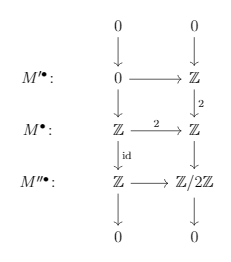Let $S$ be a commutative unital Noetherian ring. Let $D^+(S)$ be the derived category of bounded-below cochain complexes. Given $M^\bullet\in D^+(S)$, define $$\operatorname{Ass}(M^\bullet):= \bigcup_i \operatorname{Ass}(H^i(M^\bullet)).$$ Consider the following (incorrect) statement:
$(\ast)$ Let $M'^\bullet\to M^\bullet \to M''^\bullet \xrightarrow{+1} $ be a distinguished triangle in $D^+(S)$. Then $$\operatorname{Ass}(M^\bullet) \subseteq \operatorname{Ass}(M'^\bullet)\cup \operatorname{Ass}(M''^\bullet).$$
A counterexample to $(*)$ is the following short exact sequences of complexes:
In this situation, $\operatorname{Ass}(M^\bullet)=\operatorname{Ass}(\Bbb Z/2\Bbb Z) = \{(2)\}$, while the other only associated prime of the other two complexes is $(0)$.
My question
Is there a "commonly occurring" (take that to mean what you will) situation in which $(*)$ or something similar does hold?

